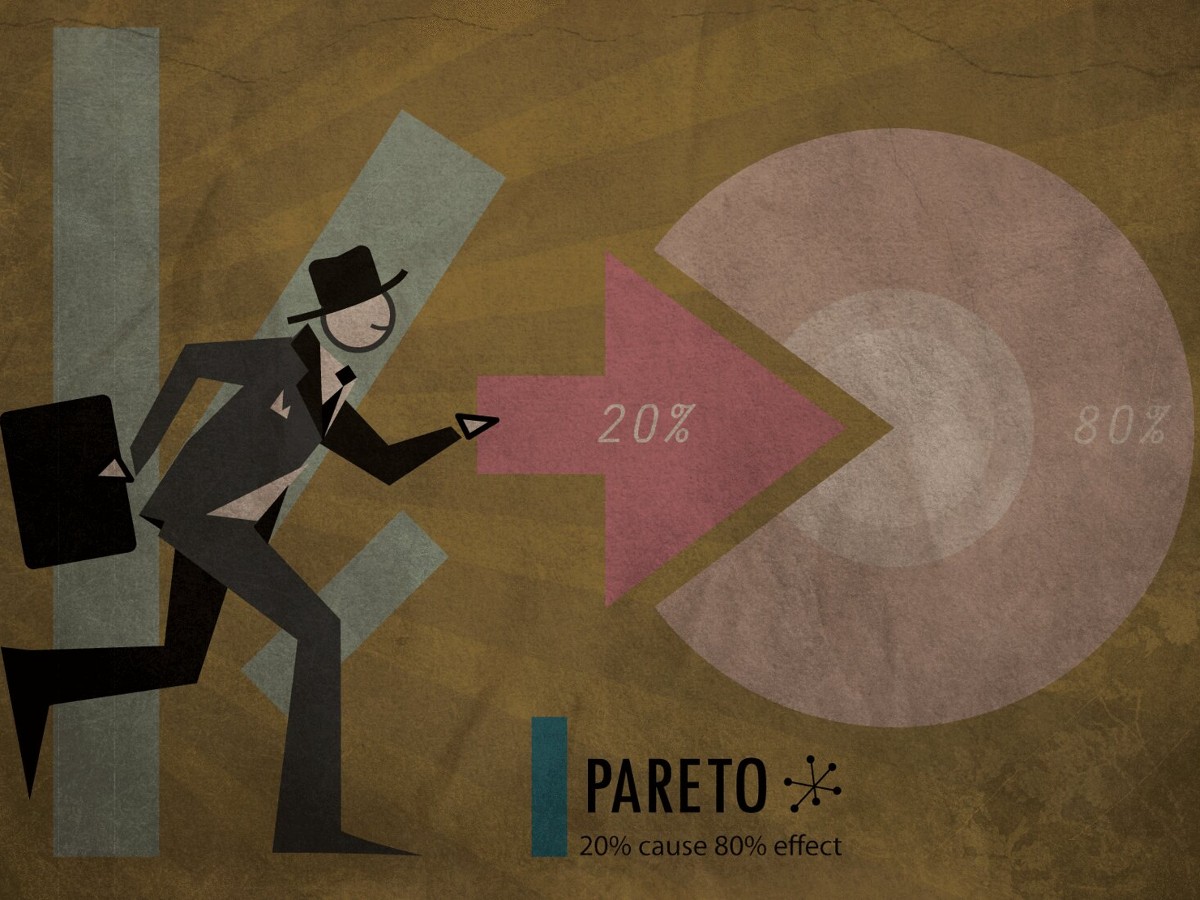
Pareto’s 80-20 Principle
The 80/20 Principle, or Pareto’s Law, is a pattern that has been observed in countless fields from economics and business to engineering. It notes that the natural distribution of many statistics is not even. Reality tends to show that roughly 80 percent of results are from 20 percent of causes. What does this have to do with Lent? Let’s see.
Application of the Rule
What is unique about the 80/20 rule, is that it is not always obvious to us. Our brains like to think that events in the world are even. We want to assume fairness, yet there tends to be tasks, problems, et cetera that are more important. That 20% is where we should focus our attention because they make most of the impact.
Now that you know the rule, how can you apply it? By locating where it is true and taking advantage of it.
Improve the Good
Say there is a business where 20% of sales is making most of the profit. If you can identify which what products are more profitable or what customers buy more from you, now you can prioritize your work and investments around those people and goods.
This Lent, what is an area of your spiritual life where a little bit goes a long way? Is it reading scripture, finding quiet prayer time, or going to mass? If you identify what brings you closer to God, I think you should add a little more time doing that this Lent.
Prevent the Bad
Similarly, when things aren’t going well, 80% of your problems probably come from 20% of causes. If you can locate what issue is giving you the most trouble, then you know where to focus. You would not want to fixate on a minor one-off problem that occurs once when there is a small change you can make to solve more frequent issues.
In a factory, you might have 100 part failures a year. If 80 of those have to do with bad welds, whereas the rest are a mix of wiring, supply, or whatever else, then you might want to focus on welding quality first.
For our spiritual life, is there an area that is distracting us from God? What causes 80% of the times we decide not to pray? If we could prioritize our sacrifices to be offline more, be more present to God and others, we could prevent those missed opportunities to grow this Lent.
Complete the Project
Lastly, 80% of your accomplishments likely come from 20% of your effort. If you like to get things done quickly and see fast results, this is good and bad news. On any project it is relatively easy to get big initial results. However, wrapping up that same project to its entirety will take a lot more work.
I recently did some home remodeling. At first, framing and drywall showed promising progress to make the space feel new. Even installing flooring and painting went fairly smoothly. The rooms looked 80-90% finished when suddenly I felt like progress halted. Why did it halt? Trim. The last 10% of my remodel is the fine details that take way more effort.
Knowing this, I can plan ahead and have expectations throttled to expect my project to take longer if I want it done right.
Similarly, Lent is a long time, we can brace our expectations for that and prepare to push through.
Don’t Polish the Cannonball
On the other hand, I have to be okay not being perfect. At times, I can apply the 80-20 principle to get a job done quick and call it good.
My old boss who was former-Navy would often say, “Don’t polish a cannonball.“
On one calculation I was wasting time calculating the exact strength of a part when all I had to do was show it was strong enough. If a little bit will work, you don’t have to over-do everything. Don’t polish the cannonball.
At home, I think about this on nights when I am exhausted. It’s time to clean up the kitchen, and the floor is a mess. Some nights, a quick sweep will get 80% of the food and crumbs under the table. I don’t need to get every spec of dust against the wall every night. It will still be there for me tomorrow. For now, I need my sanity.
Effort and Expectations in Lent
Your Lent will not be perfect.
This is where we can curb our expectations, and trust that God will help us with the rest.
Maybe you want to pray the rosary this Lent. You set a goal to pray it every day, but it’s late and you’re tired. Can you fit in a decade as you fall asleep? Can you say some Hail Mary’s on a drive.
Sometimes for resolutions and goals, its nice to give yourself the grace to say, “This Lent, I will start praying the rosary daily.” That word “start” allows you to keep going even when you miss. You have the whole season to practice forming the habit.
The 80-20 Principle and Lent
So how can we apply this rule to our spiritual life?
Are there areas that we can improve on by doing more of the good? Do we have flaws that could be removed by focusing our fasts and sacrifices on the 20% of causes? Maybe you have a great 80% prayer life from the ordinary time of year, and you want to use lent to put the icing on the cake, or finish the trim work by adding on something extra to be closer to Jesus or intercede for others.
Lent is a time to focus on prayer, fasting, and giving alms. How else can we use the 80-20 Principle to make the best in these areas of our spiritual life for the next 40 days?
St. Joseph Novena
This week, on March 10th, the St. Joseph Novena begins. Last year, I put together supplemental posts that go along with EWTN’s reflections on St. Joseph for each day leading up to his Feast day on the 19th.
If you’d like to follow along with those reflections or have a bullet summary of all of St. Joseph’s traits that he models for us, you can check out those posts here!
- March 10th, Day 1: Fatherhood
- March 11th, Day 2: Spouse
- March 12th, Day 3: Man Chosen by God
- March 13th, Day 4: Faithful Servant
- March 14th, Day 5: Patron of Church, Patriarch
- March 15th, Day 6: Patron of Families
- March 16th, Day 7: Patron of Workers
- March 17th, Day 8: Friend in Suffering
- March 18th, Day 9: Patron of a Happy Death














